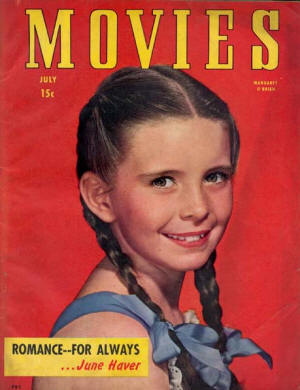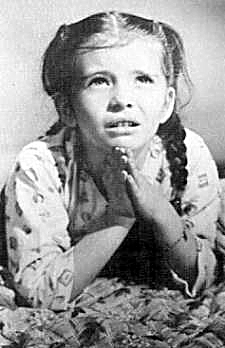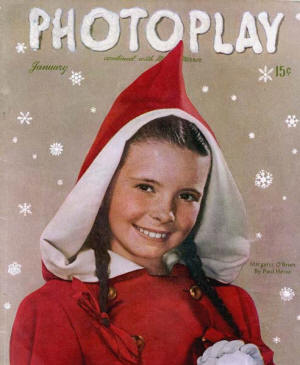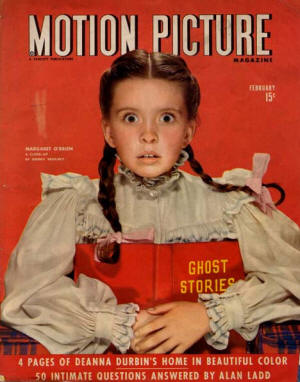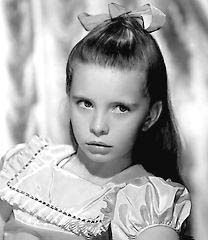
-
Margaret O'Brien |
|
|
|
| Margaret O'Brien sure could cry. She could turn the waterworks on and off with
a literal blink of the eye. When a director talked to her about a scene in which she would be called upon to weep, Margaret was all business. Did the director want just one eye to glisten, both eyes to fill, or actual tears? And if tears, how many? From one eye or two? Where did he want the tears to stop? Halfway down her face, or should they continue all the way to the chin? Given Margaret's incredible control over her lachrymosity, it is likely that we shall never know the truth about the tears she shed on February 22nd, 1949, when her mother, Gladys O'Brien, married orchestra leader Don Sylvio. |
|
| Margaret O'Brien did not like Don Sylvio. Did-not, did-not, did-not! But she couldn't talk her mother out of marrying the guy. | |
| During the wedding ceremony, 12-year-old Margaret cried, clenched her fists, and refused to kiss her new stepfather for the benefit of attending photographers. |
|
| A mere three months later, Gladys O'Brien told a reporter, "Margaret is very happy about the annulment I am planning... but I do want to make it clear she had nothing to do with it." | |
| Don Sylvio begged to differ. "If I could discuss Margaret's role in the annulment, it would make quite a story, believe me. If Gladys insists on filing the suit, I'll issue a statement that should be interesting reading." | |
| Gladys countered that the
marriage was "all wrong from the beginning" and characterized it as
"a fraud," since the two had never lived together as man and wife.
Sylvio shot back with a line that, had it been spoken in a motion picture of the time, would surely have run afoul of the censors. "Why, that's ridiculous. The marriage was consummated as late as last Monday night!" |
|
| Sylvio continued: "Some people have an aversion to child actresses, but I haven't. Nor do I have a personal aversion to Margaret, except when she interferes with my marriage . . . I'm the middleman all the way through in this case. I can't do battle with a little child. But there's just so much a man can take." | |
| Don Sylvio must have reached his boiling point at least once. In her filing for divorce, granted on September 5th, 1950, Gladys stated that Don Sylvio (whose real name was disclosed as Sylvio Sprigata) "twisted my arm and threatened to knock my teeth out." | |
| The marriage and its quick and sensational dissolution didn't help Margaret's career, which wasn't in great shape to begin with. | |
| Her contract with MGM was up for
renewal that October, and executives who saw her in the studio
commissary whispered to each other about how tall she was getting
and how much older she looked. Gladys compounded tensions when she took Margaret to Europe without MGM's permission; Margaret's salary was suspended in retaliation. Gladys had been a tough negotiator for Margaret in the past, but Margaret had "outgrown her clout," so to speak. Gladys told MGM that if they couldn't pay her price, they should release Margaret from her contract. She was probably surprised by how quickly MGM said "yes" and showed her to the door. |
|
| Margaret O'Brien didn't realize that "The Secret Garden," released in 1949, would turn out to be her last film for MGM. Nor did she realize that a bit player in that same film would ultimately provide the voice of Disney's "Alice In Wonderland," even though Walt Disney had already publicly announced that Margaret would be his "Alice." | |
| Gladys predictably thought her
daughter was worth much more than Disney was offering to pay. She
must have figured she had Walt over a barrel, since he had already
introduced Margaret to the world as the star of his "Alice In
Wonderland." "My mother had a big fight with Walt Disney," Margaret admitted in an interview years later with Allan Ellenberger for Classic Images. "What it was all about, I donít know. I think it was over money. And he was going to sue us - it was a big deal." |
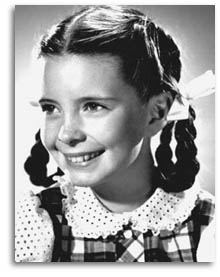 |
| Walt didn't sue, he simply corrected his mistake. | |
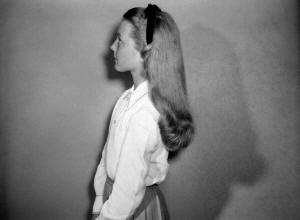 Four days after he announced that O'Brien was in... he announced she
was out. Or, more politely stated, that Margaret O'Brien and her
mother had withdrawn from the deal.
Disney then turned to another young woman who had been
also been under contract at Metro, and also recently let go... Kathryn Beaumont. A mere four hours
after her test was completed, Disney offered her the role. Recording
started June 19, 1949. Four days after he announced that O'Brien was in... he announced she
was out. Or, more politely stated, that Margaret O'Brien and her
mother had withdrawn from the deal.
Disney then turned to another young woman who had been
also been under contract at Metro, and also recently let go... Kathryn Beaumont. A mere four hours
after her test was completed, Disney offered her the role. Recording
started June 19, 1949. |
|
| One wonders, then, what to
make of stories about the Disney talent search search, looking for
the perfect voice that would be "not too British for an
American audience yet English enough to satisfy the British." Margaret O'Brien hardly fit this bill. Her English accent in "The Secret Garden" was rocky at best and widely criticized. What seems more likely is that the "not too British" phrase was originally used to describe the wonderful quality of Kathryn Beaumont's voice... and only later promoted as what Disney had been seeking all along. Given the fact that identifiable celebrity voices were chosen for "Alice" (i.e., Ed Wynn and Keenan Wynn [later replaced by Jerry Colonna]) and that it was the first Disney animated film to give voice credits, Margaret O'Brien may have been recruited for the star power she would bring to the marquee. For a time, the film was to be part live-action, part-animation, and again, Margaret O'Brien would make sense. In Neal Gabler's 2006 biography of Disney, the author states that "[Walt] had floated the name of childhood actress Margaret O'Brien not only because O'Brien might attract an audience but also because she was under contract at MGM and her involvement might entice MGM to distribute the film rather than RKO, with whom the Disneys were disillusioned. Whatever. Today, it's almost as hard to imagine that Margaret O'Brien was first choice for "Alice in Wonderland" as it is to imagine that - had 20th Century Fox been willing to loan her to MGM - Shirley Temple would have been Dorothy in "The Wizard of Oz." |
|
| Return to Kathryn Beaumont Home Page | |
| Photos
on this page came from excellent Margaret O'Brien Sites: Reel Classics Classic Movies Classic Movie Kids |
|
